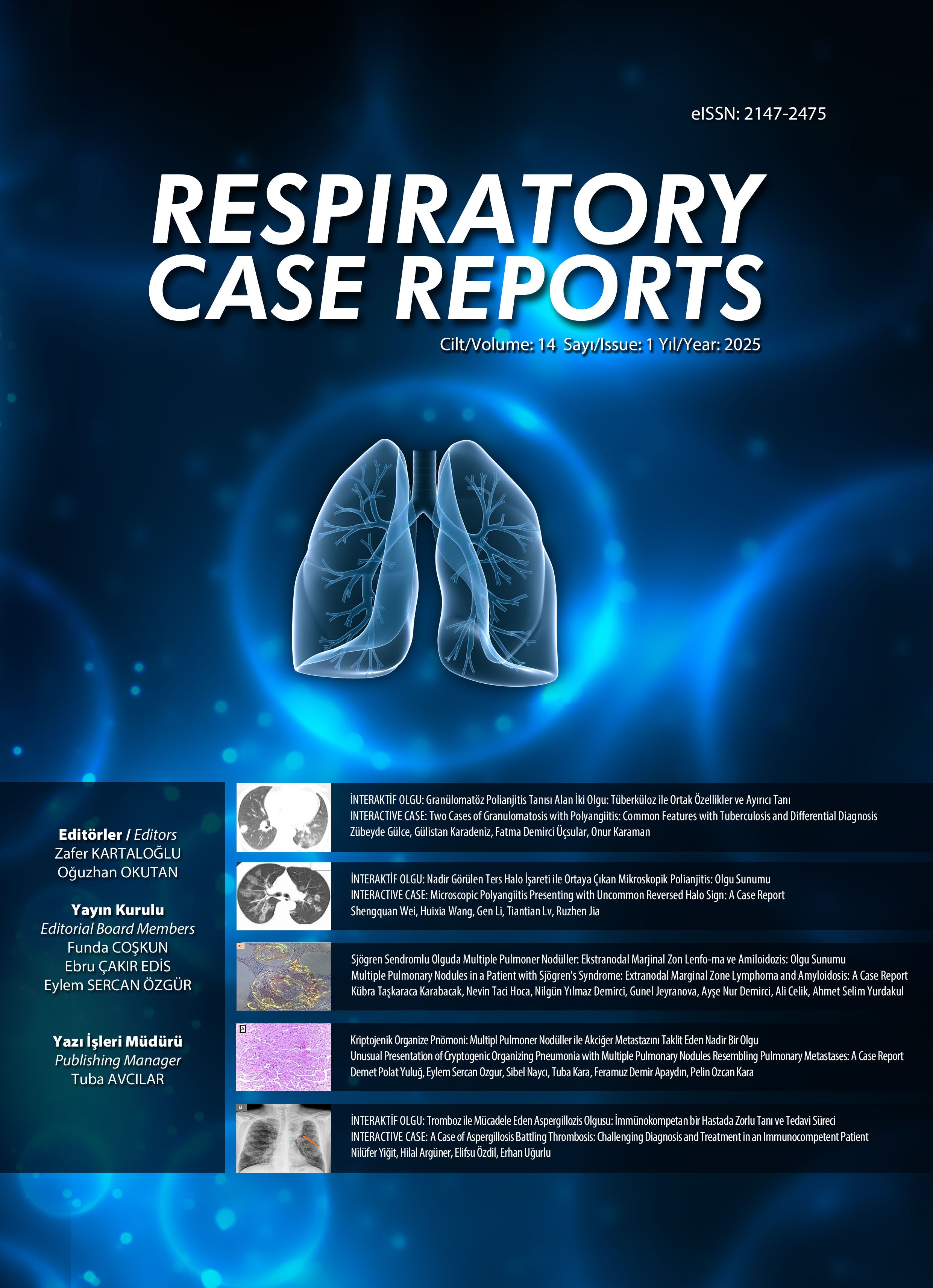
Plevral sıvının bir nedeni Ailevi Akdeniz Ateşi
Efsun Gonca Uğur Chouseın1, Sinem Karaosman Iliaz2, Hülya Abalı1, Sakine Öztürk1, Emel Çağlar11Yedikule Göğüs Hastalıkları Ve Cerrahisi Eğitim Ve Araştırma Hastanesi Istanbul2Koç Üniversitesi Tıp Fakültesi Göğüs Hastalıkları Departmanı Istanbul
Kırk bir yaşında kadın hasta tekrarlayan ateş, sol yan ağrısı, nefes darlığı yakınmalarıyla başvurdu. Arka-ön akciğer grafisinde solda plevral efüzyon ile uyumlu görünüm saptandı. Torasentez ile alınan plevral sıvı örnekleri eksuda özelliğinde olup nötrofil hakimiyeti mevcutu.Hastaya plöropnömoni tanısıyla antibiyoterapi uygulandı ve klinik ve kısmi radyolojik iyileşmeyle taburcu edildi. Üç hafta sonra aynı şikayetlerle tekrar kliniğimize müracaat etti. Hastaya Video Assisted Torakoskopi uygulandı. Biyopsi sonucu kronik non-spesifik plörit olarak geldi. Anamnez derinleştirildiğinde iki çocuğunda Ailevi Akdeniz Ateşi( AAA) olduğu ve hastanın M680I( G/C) heterojen taşıyıcısı olduğu öğrenildi. Romatoloji bölümüyle konsülte edilerek hastaya oral kolşisin 0,5 mg 2x1 başlandı. Bu tedaviden sonra hastanın kliniği düzeldi, plevral sıvısı geriledi. AAA tanısı olan hastalarının %95 'inde ana yakınma abdominal ağrıdır. Abdominal ağrı olmaksızın plevral ağrı nadirdir. Plevral sıvı daha da nadirdir. Plevral efüzyonların etiyolojisini araştırırken Akdeniz bölgesinde yer alan ülkemizde, AAAnin de plevral sıvı nedeni olabileceğini aklımızda tutmamız gerekmektedir.
Anahtar Kelimeler: Göğüs ağrısı, plevral sıvı, Ailevi Akdeniz AteşiA cause of pleural effusion is Familial Mediterranean Fever
Efsun Gonca Uğur Chouseın1, Sinem Karaosman Iliaz2, Hülya Abalı1, Sakine Öztürk1, Emel Çağlar11Yedikule Chest Diseases And Thoracic Surgery Education And Research Hospital, Department Of Pulmonary Medicine2Koc University Hospital, Department Of Pulmonary Medicine
Familial Mediterranean fever (FMF) is an autoinflammatory disease characterized by recurrent abdominal pain and fever episodes. Pleural pain and effusion can also be seen, but rarely in the absence of abdominal pain. FMF is treated with colchicine to control symptoms and to prevent amyloidosis and renal failure. A 41-year-old woman was admitted to our hospital due to recurrent fever, chest pain, and dyspnea. She had an exudative pleural effusion and responded to antibiotic therapy with partial radiographic resolution. She had recurrence of her symptoms three weeks after the completion of therapy. Pleural biopsy by video-assisted thoracoscopy revealed chronic non-specific pleuritis. The patient disclosed that two of her offspring had FMF. Gene analysis showed she was heterozygous carrier of M680I (G/C) mutation. Treatment with colchicine led to resolution of her symptoms and of the pleural effusion. Turkey has a high prevalence of FMF. Pulmonologists should consider FMF in the differential diagnosis of patients with recurrent pleural effusions
Keywords: Chest pain, pleural effusion, Familial Mediterranian FeverMakale Dili: Türkçe











